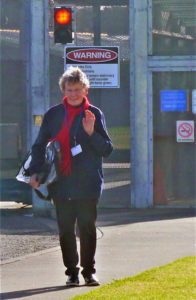The prison gate clanged behind me for the last time.
 Usually, people coming through this gate for the last time are over the moon with happiness. Not I. Today I am sombre? Nostalgic? After six years of teaching literacy at Whanganui Men’s Prison, I have said goodbye. Plenty of pressure from the programmes department to continue but this is it. At 90, it is time to move on.
Usually, people coming through this gate for the last time are over the moon with happiness. Not I. Today I am sombre? Nostalgic? After six years of teaching literacy at Whanganui Men’s Prison, I have said goodbye. Plenty of pressure from the programmes department to continue but this is it. At 90, it is time to move on.
Since 2013, this is where I’ve been every Tuesday and Wednesday morning at the Visits Department in a small room furnished with a table and two chairs. One side of the room, a large window facing a corridor where officers pass frequently for a quick check that all is well within. Over the six years I’ve met with twenty-four clients here, men who have accepted the chance of one-to-one help from a volunteer, through the prison programmes department.
It is amazing the number of young men (and not so young) who can’t read, struggle with reading, can’t spell and can’t write – but in the prison, away from the public eye and away from family watching their struggles, they welcome one-to-one help and come on in leaps and bounds.
The man across the table was never a prisoner to me but someone seeking literacy help. Sounds, sentences and syllables were the order of the day. Double sounds, triple blends, vowels, consonants, flowed freely. Capitals and full-stops… most important. Punctuation perfect. So many laughs. Profuse apologies if a swear word slipped out – and slip out they did. They were so in earnest. Wanted to improve. Wanted to read.
They enjoyed this time out from the overcrowded wing. Came in with a cheery “good morning” wanting to know what I’d been up to over the past week – garden, any new planting? How was the river looking? Had I walked around the lake? Were the turtles out on the log at the lake? The birds in the aviary? Shrapnel (cat)? When Shrapnel died they seemed to take it as a personal loss. Eric said, “I can’t read today. I’m so upset.”
 All conversation was general and one-sided. I knew nothing of their crime or length of sentence and, of course, was not permitted to tell them personal matters especially any addresses or where I lived in Whanganui. But a chat now and then again about the turtles at the lake or a new geranium cutting for the garden went a long way towards creating a good atmosphere and taking a break from the work ethic. Sometimes it evoked a past memory – “My daughter once had a cat” … or … “I lived near a river” … or … “My partner likes gardening.”
All conversation was general and one-sided. I knew nothing of their crime or length of sentence and, of course, was not permitted to tell them personal matters especially any addresses or where I lived in Whanganui. But a chat now and then again about the turtles at the lake or a new geranium cutting for the garden went a long way towards creating a good atmosphere and taking a break from the work ethic. Sometimes it evoked a past memory – “My daughter once had a cat” … or … “I lived near a river” … or … “My partner likes gardening.”
I liked these men. They were all so different, yet respectful, grateful – and they enjoyed a laugh. They endeared themselves to me and I may have endeared myself to them, too.
Go well Richard, Keanu, Elisha, Eric and all twenty-four of you. I remember you all. The main thing is to keep reading, read every day, read at the library, read in your homes, read within the prison walls (those of you still there) … and all remember to stop at the full-stops! There is no hurry!
My hope is that I’ve lit a few fires out at Whanganui Men’s Prison and set a few sparks flying around, too, as I recall these words of Victor Hugo…
And every syllable spelled out is a spark.
Photo: man holding chain-link fence by Milad B. Fakurian obtained from Unsplash. Used with permission.
